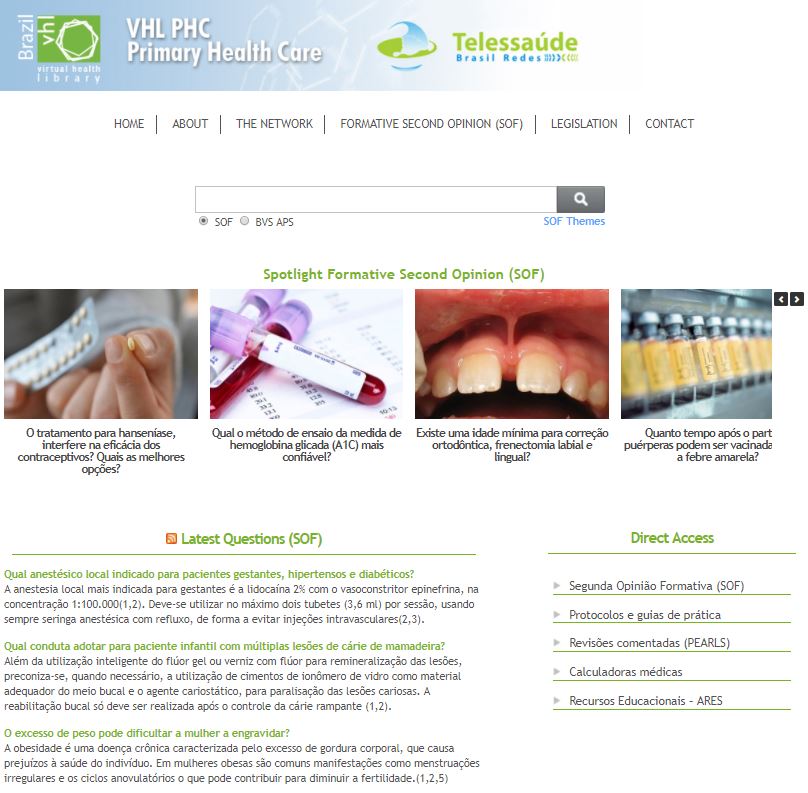To celebrate the 10th anniversary of the Programa Telessaúde Brasil, the Rede Nacional de Pesquisas of Brazil (RNP) organized a publication with reports of experiences of several people and organizations that participated in the history of creation and implementation of the Program focused on Primary Care. BIREME was one of the institutions invited to report the experience entitled “scientific evidence integrated to telehealth actions”, written by Verônica Abdala.
Indeed, from the beginning of the discussions about the creation of the then “Projeto de Telemática e Telemedicina em Apoio à Atenção Primária à Saúde no Brasil”, in 2005, which gave way to the current Programa Telessaúde Brasil Redes, the issue of scientific evidence has been present, providing guidance so that both the choices of distance education and the decisions on diagnoses and treatment would be based on the conclusions of the studies with good scientific evidence, and be appropriate for the Sistema Único de Saúde (SUS).
All the actions and services developed within the realm of the Program should consider and respect the policies, protocols, guidelines, and recommendations of the Ministry of Health for healthcare of the Brazilian population, for the Family Health Strategy and for the SUS. On the other hand, the Program defined the qualification of the Family Health Teams is strategic, by means of ongoing training. Therefore, the Program understood it was vital to facilitate access to information and to the best scientific evidence by these teams, as well as to employees of the Network, especially for the teams of the Telehealth Centers, responsible for the development of content and of the teleconsultations, including formative second opinions. Access to scientific and technical knowledge should be largely promoted and be available, both for the development of educational content and for the telehealth services offered within the context of Primary Care.
This orientation was recorded in specific objective # 9 of the initial Project:
To provide broad access to a network of sources of information on good evidence in primary care in order to subsidize the processes of clinical decisions, training, and management in the area.
In order to reach this objective, a collection of sources of information was required to support the decision-making processes and the development of resources for training the Family Health teams, as well as to establish recording of and access to the contents developed by the Telehealth Centers and other partners of the Program. This need justified the inclusion of a module of information and knowledge management in the first pilot project of the Programa Telessaúde, in cooperation with BIREME and PAHO/WHO.
In 2007, BIREME presented the proposal of building the Primary Care Virtual Health Library (PC-VHL) as an integral part of the Programa Telessaúde. The first version of PC-VHL was launched in October of the same year, and almost 10 years later, it is still available at http://aps.bvs.br.
Tribute to the first partners of the Programa Telessaúde Brasil
As an acknowledgment of the first partner organizations of the Programa Telessaúde Brasil Redes, the Ministry of Health, on behalf of the Secretaria de Gestão do Trabalho em Saúde [Department of Work Management in Health], delivered a certificate to the representatives of these institutions during the Seminário de Telessaúde, held within the scope of the X Congresso Brasileiro de Telemedicina e Telessaúde, in Gramado, RS, Brazil, on November 14-17, 2017.
 BIREME was one of the acknowledged organizations, along with the Rede Nacional de Pesquisas (RNP) and the first Telehealth Centers of the following universities: Amazonas, Ceara, Goias, Mato Grosso, Minas Gerais, Pernambuco, Rio de Janeiro, Rio Grande do Sul, Santa Catarina, and Sao Paulo.
BIREME was one of the acknowledged organizations, along with the Rede Nacional de Pesquisas (RNP) and the first Telehealth Centers of the following universities: Amazonas, Ceara, Goias, Mato Grosso, Minas Gerais, Pernambuco, Rio de Janeiro, Rio Grande do Sul, Santa Catarina, and Sao Paulo.
The program of the Seminário also highlighted the 10-year history of the Programa Telessaúde Brasil. Verônica Abdala, BIREME representative, gave a presentation portraying the key milestones of the cooperation between the Center and the Program, emphasizing the creation of the database “Formative Second Opinion”, which has transformed into an important source of information to translate knowledge for healthcare teams.
